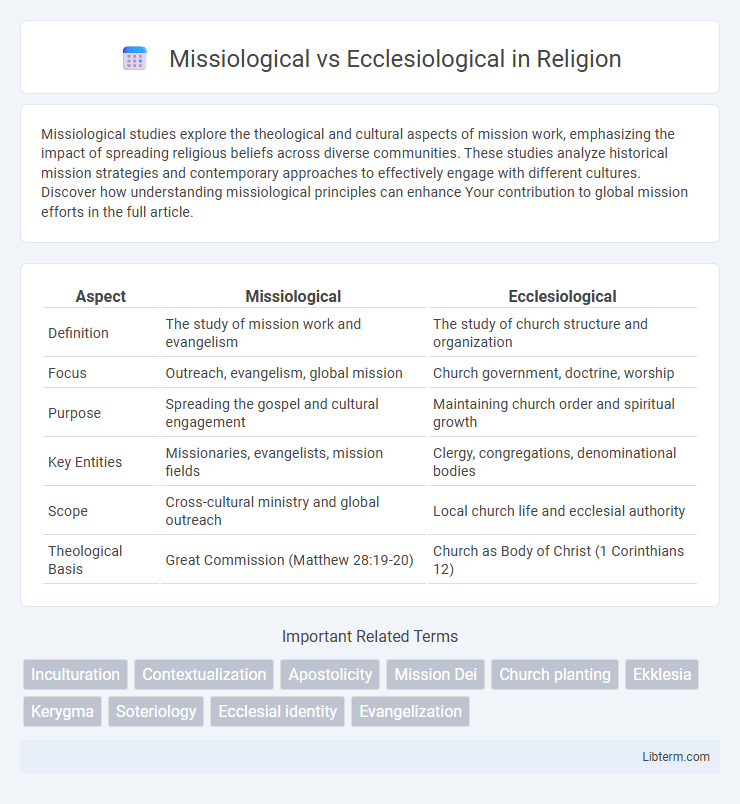Missiological studies explore the theological and cultural aspects of mission work, emphasizing the impact of spreading religious beliefs across diverse communities. These studies analyze historical mission strategies and contemporary approaches to effectively engage with different cultures. Discover how understanding missiological principles can enhance Your contribution to global mission efforts in the full article.
Table of Comparison
| Aspect | Missiological | Ecclesiological |
|---|---|---|
| Definition | The study of mission work and evangelism | The study of church structure and organization |
| Focus | Outreach, evangelism, global mission | Church government, doctrine, worship |
| Purpose | Spreading the gospel and cultural engagement | Maintaining church order and spiritual growth |
| Key Entities | Missionaries, evangelists, mission fields | Clergy, congregations, denominational bodies |
| Scope | Cross-cultural ministry and global outreach | Local church life and ecclesial authority |
| Theological Basis | Great Commission (Matthew 28:19-20) | Church as Body of Christ (1 Corinthians 12) |
Defining Missiological and Ecclesiological Perspectives
Missiological perspectives emphasize the study of mission and its role in spreading the gospel, focusing on cross-cultural evangelism, contextualization, and the dynamics of church planting. Ecclesiological perspectives concentrate on the nature, structure, and function of the church, exploring its governance, sacraments, and community life within theological frameworks. Understanding these distinct yet interconnected viewpoints clarifies how the mission of the church and the church itself are conceptualized and practiced in various Christian traditions.
Historical Development of Missiology and Ecclesiology
The historical development of missiology traces its roots to early Christian missionary activities, emphasizing the theological study and strategic understanding of global mission work. Ecclesiology evolved through the centuries as a systematic examination of the church's nature, structure, and function, with key contributions from Church Fathers and reformers shaping its doctrinal foundations. Both disciplines influenced each other, as missiological insights informed ecclesiological concepts about the church's role in salvation history and cultural engagement.
Core Principles of Missiological Thinking
Missiological thinking centers on the core principles of contextualization, cultural engagement, and the proclamation of the gospel to unreached populations, emphasizing the global mission of the church. It prioritizes understanding diverse cultures and communicating the Christian message effectively within various social frameworks, which contrasts with ecclesiological focus on church structure, governance, and internal practices. Core missiological principles include incarnational ministry, holistic transformation, and the partnership of local and global churches in advancing the kingdom of God worldwide.
Foundational Elements of Ecclesiological Doctrine
Foundational elements of ecclesiological doctrine include the nature, purpose, and authority of the church, emphasizing its identity as the Body of Christ and its role in worship, fellowship, and sacraments. Missiological doctrine primarily addresses the church's mission to evangelize and disciple, focusing on outreach and conversion as extensions of ecclesiological principles. Understanding ecclesiology provides the theological framework for mission strategies, grounding missiology in the church's doctrinal essence and communal life.
Mission vs. Church: Distinctive Focus and Priorities
Missiological perspectives prioritize the global mission of spreading the gospel, emphasizing cross-cultural evangelism and church planting as central to Christian witness. Ecclesiological approaches focus on the nature, structure, and function of the church itself, stressing community formation, worship, and doctrinal integrity within established congregations. The mission centers on outward expansion and contextual engagement, whereas ecclesiology concentrates on inward continuity and ecclesial identity.
Theological Implications for Church Practice
Missiological perspectives emphasize the church's mission to engage and transform cultures, highlighting evangelism, cross-cultural communication, and social justice as theological imperatives for church practice. Ecclesiological frameworks stress the nature, structure, and sacramental life of the church, shaping worship, governance, and community formation according to doctrinal fidelity and historical continuity. Integrating missiology with ecclesiology fosters a holistic church practice that balances outreach with internal spiritual growth and doctrinal integrity.
Missiological Approaches to Community Engagement
Missiological approaches to community engagement emphasize contextualization and incarnational presence, prioritizing holistic ministry that addresses spiritual, social, and economic needs within diverse cultural settings. These strategies involve participatory methods, empowering local communities through relationships and cultural sensitivity to foster sustainable transformation. Missiology integrates theological reflection with practical action, ensuring that mission efforts resonate authentically within the community's lived experience.
Ecclesiological Models of Church Governance
Ecclesiological models of church governance focus on the organizational structure, authority, and decision-making processes within the church, emphasizing how leadership and membership interact to fulfill the church's mission. These models include episcopal, presbyterian, and congregational systems, each defining distinct roles for bishops, elders, or congregants in maintaining doctrinal unity and spiritual oversight. Understanding ecclesiology is critical for shaping governance structures that support mission strategies and theological commitments in diverse Christian traditions.
Integrating Missiology and Ecclesiology in Ministry
Integrating missiology and ecclesiology in ministry enhances church effectiveness by aligning mission strategies with theological understandings of the church's nature and purpose. This integration fosters a holistic approach where the church actively engages in contextualized evangelism, discipleship, and community transformation. Emphasizing both missional outreach and ecclesial identity ensures sustainable growth and meaningful impact within diverse cultural settings.
Future Trends in Mission and Church Studies
Future trends in mission and church studies emphasize the integration of missiological strategies with ecclesiological frameworks to address global cultural shifts and digital transformation. Emerging research prioritizes contextualized mission approaches that adapt ecclesial structures for enhanced cross-cultural engagement and community resilience. Advances in technology and interdisciplinary methodologies will drive innovative paradigms in both missiology and ecclesiology, fostering adaptive leadership and collaborative ministry models.
Missiological Infographic

 libterm.com
libterm.com